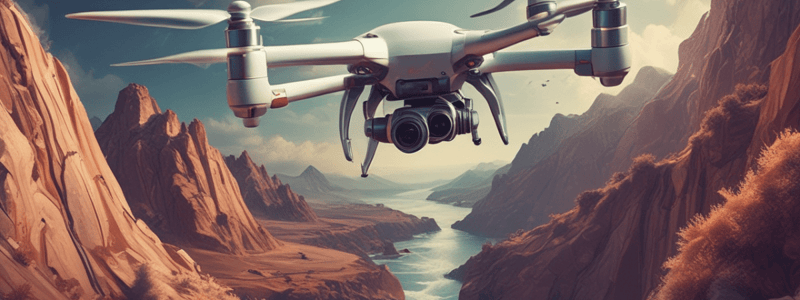Podcast
Questions and Answers
What is the recommended setting for shutter speed in aerial videography?
What is the recommended setting for shutter speed in aerial videography?
- Triple the frame rate
- Equal to the frame rate
- Half the frame rate
- Double the frame rate (correct)
What is the purpose of recording for 10-15 seconds after the select?
What is the purpose of recording for 10-15 seconds after the select?
- To capture more footage
- To verify the shot was recorded
- To have a nice transition or buffer footage (correct)
- To test the drone's camera
What is the main focus of the aerial videography course?
What is the main focus of the aerial videography course?
- Drone maintenance and repair
- Settings, equipment, and techniques for smooth shots (correct)
- Flight safety and regulations
- Subject tracking and cinematic shots
Why is practice essential in aerial videography?
Why is practice essential in aerial videography?
What is NOT covered in the aerial videography course?
What is NOT covered in the aerial videography course?
Flashcards are hidden until you start studying
Study Notes
Aerial Videography Course
- The course is designed to help students master the confidence to capture smooth shots, including crane shots, reveal shots, sliding shots, orbital shots, and more.
Key Settings for Smooth Shots
- Always use an ND filter unless it's overcast.
- Ensure shutter speed is double the frame rate.
- Don't forget to hit the auto exposure lock button.
Recording Tips
- Only shoot selects to avoid capturing unnecessary footage.
- Set up the shot, click record, make the shot, and then click record again.
- Some pilots record for 10-15 seconds after the select to have a nice transition or buffer footage.
Importance of Practice
- Practice makes perfect, and it's essential to practice these shots in the field to master them.
- Record every shot and watch it to improve.
Course Overview
- The course will cover settings, equipment, and techniques for capturing beautiful, smooth, cinematic shots.
- It will not cover subject tracking, which is a separate course.
- It will cover various shots and sequences from different drones to demonstrate different looks.
Instructor and Course
- The course is taught by Paul Aken, and it's offered by Drone U.
Aerial Videography Course
- The course aims to equip students with the confidence to capture various smooth shots, including crane shots, reveal shots, sliding shots, and orbital shots.
Key Settings for Smooth Shots
- Use an ND filter in all conditions except overcast weather.
- Set the shutter speed to twice the frame rate.
- Don't forget to press the auto exposure lock button.
Recording Tips
- Only capture selective footage to avoid unnecessary recordings.
- Record footage in a specific sequence: set up the shot, click record, make the shot, and then click record again.
- Record an additional 10-15 seconds after the select to get a smooth transition or buffer footage.
Importance of Practice
- Consistent practice in the field is crucial to master smooth shots.
- Record every shot and review it to improve.
Course Overview
- The course covers settings, equipment, and techniques for capturing cinematic shots.
- The course does not cover subject tracking, which is a separate course.
- The course features various shots and sequences from different drones to demonstrate different visual styles.
Instructor and Course
- The course is taught by Paul Aken.
- The course is offered by Drone U.
Studying That Suits You
Use AI to generate personalized quizzes and flashcards to suit your learning preferences.



